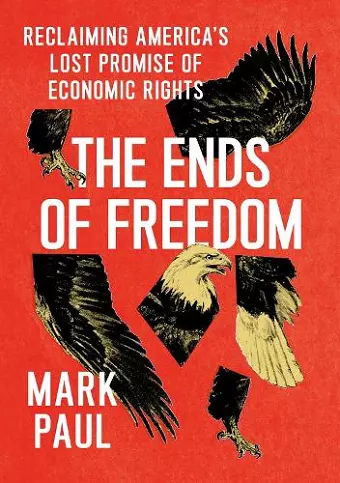The Ends of Freedom
Reclaiming America's Lost Promise of Economic Rights
Format:Hardback
Publisher:The University of Chicago Press
Published:12th May '23
Should be back in stock very soon

An urgent and galvanizing argument for an Economic Bill of Rights—and its potential to confer true freedom on all Americans.
Since the Founding, Americans have debated the true meaning of freedom. For some, freedom meant the provision of life’s necessities, those basic conditions for the “pursuit of happiness.” For others, freedom meant the civil and political rights enumerated in the Bill of Rights and unfettered access to the marketplace—nothing more. As Mark Paul explains, the latter interpretation—thanks in large part to a particularly influential cadre of economists—has all but won out among policymakers, with dire repercussions for American society: rampant inequality, endemic poverty, and an economy built to benefit the few at the expense of the many.
In this book, Paul shows how economic rights—rights to necessities like housing, employment, and health care—have been a part of the American conversation since the Revolutionary War and were a cornerstone of both the New Deal and the Civil Rights Movement. Their recuperation, he argues, would at long last make good on the promise of America’s founding documents. By drawing on FDR’s proposed Economic Bill of Rights, Paul outlines a comprehensive policy program to achieve a more capacious and enduring version of American freedom. Among the rights he enumerates are the right to a good job, the right to an education, the right to banking and financial services, and the right to a healthy environment.
Replete with discussions of some of today’s most influential policy ideas—from Medicare for All to a federal job guarantee to the Green New Deal—The Ends of Freedom is a timely and urgent call to reclaim the idea of freedom from its captors on the political right—to ground America’s next era in the country’s progressive history and carve a path toward a more economically dynamic and equitable nation.
"Paul’s book is a welcome contribution to thinking about policies that might help build a more just, freer society." * Jacobin *
"Without a new foundation of economic rights for all, grounded in ecological safety and racial justice, democracy will not survive. Paul is one of the economists reimagining his field to meet this moment of compounding crises, and his new book brilliantly traces the history and irresistible logic behind the demand for an economic bill of rights. It’s a gift to the social movements who are fighting to put those rights back on the political agenda, and to anyone contemplating the deeper meaning of freedom." -- Naomi Klein
"This is a fascinating book about a forgotten US intellectual tradition. Paul forcefully shows that there can be no real freedom without substantial and well-guaranteed economic rights for all: the right to education, the right to a job, and the right to housing. A must-read!" -- Thomas Piketty, L'ecole de hautes etudes en sciences sociales and Paris School of Economics
"Paul tells the full story of the nation’s yet-to-be-fulfilled promise of a guarantee of a minimum standard of economic possibility and security for all Americans. As he shows, the principles of an Economic Bill of Rights date, at least, to the founding of the Republic. Not only does Paul give us the most comprehensive treatment of the history of the idea of a social floor for opportunity, but he provides a detailed plan appropriate for the twenty-first century. This is the book that throws down a forceful gauntlet on how, at last, to create an equitable America."
-- William A. Darity Jr., Samuel DuBois Cook Distinguished Professor of Public Policy, Duke University
"In highlighting how the notion of economic freedom was hijacked by the right, Paul has put his finger on the missing link in any progressive agenda that purports to work for all Americans. The book connects the various seemingly separate strands of political crisis into one coherent idea: we need to revive a robust vision for economic freedom that centers on racial justice. Building on the core impetus of Roosevelt's Economic Bill of Rights, Paul revives it for the twenty-first century with an expert's understanding of economic trends and gaps in recent policy. This important and thorough account of history and economics will be an excellent resource for policymakers, students, activists, and citizens interested in achieving the promise of democracy." -- Mehrsa Baradaran, University of California, Irvine School of Law
"Amidst the wreckage of the failed neoliberal project to shrink the idea of freedom down to limited government, Paul advances an expanded notion of 'freedom to' rather than just 'freedom from.' His program of economic rights may just be the best hope for securing a society built on positive freedoms in a sustainable democratic order."
-- Samuel Bowles, Santa Fe Institute and author, The Moral Economy."Paul is sharp and deeply knowledgeable about his field, and his comprehensive approach is admirable. . . . A reminder of the country’s lost ideal of economic freedom and the many actions that might turn that ideal into reality." * Kirkus *
“Paul argues that leaders need to prioritize providing equitable economic rights for all Americans. The book defines economic rights as the freedom to have basic necessities such as housing, employment, and health care. . . . To actualize these programs, the book calls for changes within the Medicare system and the creation of federal job-guarantees. This book will be of interest to scholars and general readers alike.”
* Library Journal *"Mark Paul has done a useful public service in etching out the goals of progressive economic policy." * Counterpunch *
ISBN: 9780226792965
Dimensions: 229mm x 152mm x 30mm
Weight: 594g
320 pages